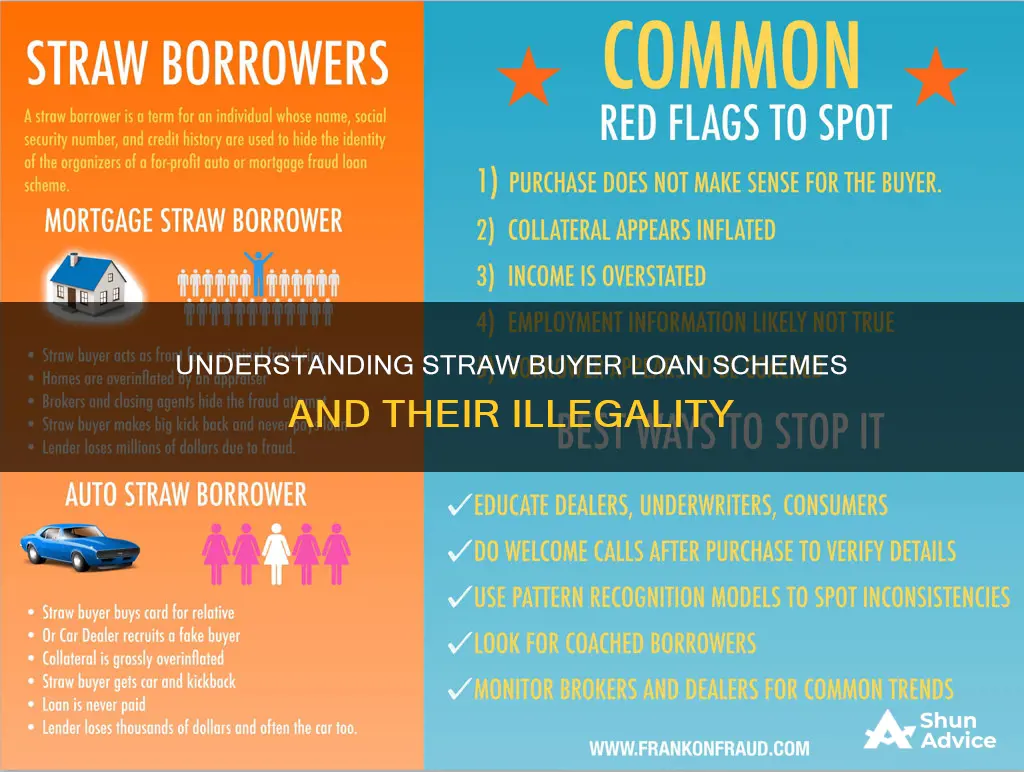
A straw buyer is a person who purchases an asset on someone else's behalf, usually to circumvent restrictions on the real buyer. This practice, also known as straw buying, is often illegal and can lead to criminal charges. Straw buyers are typically compensated for their participation in the fraud and may even be tricked into it. In the context of loans, a straw buyer applies for a loan that they have no intention of using or repaying, and the true borrower is hidden from the lender. This is a form of mortgage fraud, and it can also involve falsifying financial documents to borrow more money than qualified for. Straw buyer loans are often used in real estate transactions, where an individual with good credit secures a mortgage for someone with poor credit or multiple existing loans.
| Characteristics | Values |
|---|---|
| Definition | A straw buyer is a person who makes a purchase on behalf of another person or group, usually to circumvent restrictions on the real buyer. |
| Buyer's Intent | The buyer has no intention of using or controlling the purchased item. |
| Buyer's Identity | The identity of the real buyer is disguised. |
| Buyer's Financial Status | The real buyer is unable to make the purchase themselves due to poor credit or multiple existing loans. |
| Buyer's Relationship | The buyer and seller often share a close relationship, allowing them to avoid dealing with professionals and quickly execute the straw buyer scam. |
| Buyer's Compensation | The straw buyer typically receives compensation or a monetary award for their participation in the fraud. |
| Buyer's Awareness | The straw buyer is usually aware that they are doing something potentially illegal and may exhibit nervous body language or tone of voice. |
| Buyer's Role | The straw buyer acts as a front for the true buyer, appearing in the property documents but not intending to own or occupy the property. |
| Funding Source | The funding for the purchase or loan repayment may come from a business or organization, rather than an individual. |
| Payment Default | The loan is at a higher risk of default, with a tendency for early payment default. |
| Collateral Value | The collateral for the loan may be overvalued, indicating an attempt to obtain a higher loan amount or illegally resell the property. |
| Property Distance | The property may be located an unreasonable distance from the buyer's actual residence or workplace. |
| Purchase Anonymity | The real buyer may wish to remain anonymous and use a fictitious name for the purchase. |
| Legal Consequences | Straw buying is generally considered illegal and may result in criminal charges, including fraud, money laundering, and felony convictions. |
What You'll Learn

Straw buyers are used to commit mortgage fraud
A straw buyer is an individual who purchases a good or service on behalf of another person or group, who would otherwise be unable to make the purchase themselves. In the context of mortgage fraud, a straw buyer is a person who applies for a mortgage for a property that will actually be controlled and lived in by someone else. Straw buyers are typically individuals with good credit who pose as the buyer to get approved for the loan. They are often incentivized by monetary rewards for their participation in the fraud.
Straw buyer mortgage fraud is a type of fraud scheme in which someone purchases a home under false pretenses. The goal of a straw buyer scheme is usually to improperly obtain funds from a mortgage lender by misrepresenting the loan application. Straw buyers may be real people or, in some cases, fictitious entities. In the case of a fictitious straw buyer, an unscrupulous broker obtains a mortgage in the straw buyer's name on a non-existent property to collect the loan proceeds illegally.
Straw buyer schemes are considered criminal offenses, and those involved may face charges of mortgage fraud, mail fraud, wire fraud, tax fraud, and money laundering. These charges can lead to misdemeanor or felony convictions, substantial monetary penalties, and possible jail or prison time. Federal and state authorities actively pursue individuals involved in straw buyer schemes, regardless of their level of involvement.
Straw buying is not always illegal, but intent is the determining factor in these situations. If someone uses a straw buyer to commit fraud, it is illegal and punishable by law. The penalties for straw buying depend on the goods or property acquired, the amount of money involved, and the evident intent to commit fraud.
Borrowing Limits: Cash App's Limit Increase Frequency
You may want to see also

Straw buyers can be used to buy cars
A straw buyer is an individual who purchases a good or service on behalf of someone else, who is the true buyer. The straw buyer has no intention of using or controlling the purchased item. In the case of cars, a person who is unable to obtain a car loan due to poor credit or other reasons, uses the services of a straw buyer to make the purchase. The straw buyer has a better credit score and financial standing, which enables them to secure a loan and purchase the car. The straw buyer gets a monetary reward and the car is transferred to the actual buyer, who becomes the primary user and is responsible for making loan payments.
Straw buying for cars can be initiated by either the prospective car buyer or the dealership. While it may seem like a convenient arrangement for people who cannot secure car loans otherwise, straw purchases are illegal and both customers and dealers should avoid them. The person whose name appears on the contract, i.e., the straw buyer, bears all the financial and legal consequences if no monthly payments are made or if the car is damaged, stolen, or used for illegal purposes. The straw buyer can also take back the car whenever they want, as they are the legal owners.
Dealers can also initiate straw purchases by convincing a person with bad credit to apply for a loan with or through another individual. This is a predatory practice, as it targets people who would not qualify for financing otherwise. In some cases, dealerships may trick buyers into straw purchases by presenting additional paperwork for a co-signer, which is then used to approve the loan in the co-signer's name.
It is important to note that not all car purchases made by one person for another to drive are illegal. For example, buying a car for your child is a form of straw buying, as the actual owner does not intend to use the vehicle. However, if the child pays for the car with a loan secured by the parent's credit, it becomes a form of fraud, as the lender is being misled about the true borrower and user of the car.
Understanding DSCR Loans in Texas: A Guide
You may want to see also

Straw buyers can be unwitting participants
A straw buyer is an individual who purchases a good or service on behalf of another person or group, usually to circumvent restrictions on the real buyer. Straw buying is often an illegal activity, and the buyer may be a willing participant or unwittingly tricked into the scheme.
In some cases, a straw buyer may be a person with good credit who is used to secure a mortgage loan and buy a home for someone with bad credit. The real estate agent or broker may give the straw buyer an upfront payment to sign the loan application and any other paperwork. The straw buyer's name appears on the property's documents, but they do not intend to own or occupy the property and are only a front for the true buyer.
Additionally, straw buyers may be used to secure financing from multiple lenders using the same property as collateral. In such cases, the lenders are kept in the dark about the property being used to cover multiple mortgages. This practice increases the risk for the lenders and the likelihood that the loan will not be repaid. Even if the loan is repaid in full, it is still an illegal practice that exposes the lender to higher risk.
Straw buyers can also be unwitting participants in illegal activities such as gun purchases for people who cannot pass a background check. This crime has been committed on behalf of individual gun buyers and on a large scale for terrorists and gangs. While the use of a straw buyer is not strictly illegal if no fraud is intended, it is a form of subterfuge that disguises the identity of the real buyer.
The True Cost of Capital: Which Financing Option Costs Most?
You may want to see also

Straw buyers can be used to buy guns
A "straw buyer" is an individual who purchases a good or service on behalf of another person or group, usually to circumvent restrictions on the real buyer. Straw buyers are often used in real estate to purchase additional properties when the real buyer already has multiple mortgages and may struggle to get approval for another.
Straw buyers can also be used to buy guns. This is often done by individuals who are prohibited from owning firearms—such as felons, domestic abusers, or individuals with certain mental health conditions—to bypass background checks and obtain weapons. Straw purchasing of firearms poses a serious risk to public safety, as it allows people who might pose a danger to themselves or others to gain access to guns. Straw-bought guns are often used in violent crimes, including homicides, robberies, and gang-related activities, and they are also trafficked across borders, fuelling violence and criminal activity in other countries.
In the United States, federal law prohibits certain individuals from legally purchasing firearms, and straw purchasing is illegal. A federal law signed in 2022 aimed to combat straw purchasing, and those caught can face lengthy prison sentences. Despite this, evidence suggests that straw purchases are becoming more common. The Bureau of Alcohol, Tobacco, Firearms and Explosives (ATF) defines a straw purchase as buying a firearm for someone who is prohibited by law from possessing one. ATF aggressively pursues those engaged in straw purchasing, as gun retailers can also deter attempts by posting signage indicating the illegality and penalties associated with straw purchases.
Exclusive Access: Members-Only Group Benefits
You may want to see also

Straw buyers can be used to buy overseas property
A straw buyer is an individual who purchases goods or property on behalf of another person, usually to circumvent restrictions on the real buyer. The straw buyer then hands over the purchased goods, sometimes in return for a kickback. In the context of overseas property purchases, a straw buyer can be used to bypass legal restrictions that prevent certain individuals from buying real estate in a foreign country. For example, a Chinese citizen who is restricted from buying real estate abroad may hire a straw buyer, often an agent, to circumvent this regulation.
Straw buying is often associated with mortgage fraud, as it involves disguising the identity of the true buyer and the nature of the transaction. In the case of overseas property, a straw buyer may apply for a mortgage on a non-existent property to illegally obtain loan proceeds. The use of straw buyers for overseas property purchases can also be leveraged to evade tax obligations or hide assets in a divorce.
It is important to note that straw buying is generally considered illegal, particularly when it involves fraud or criminal activity, or when it is done on behalf of someone who is legally barred from making the purchase. However, straw buying can be legal in certain instances, such as when a parent purchases a home for their adult child. Additionally, companies sometimes use straw buyers to acquire property without attracting attention or causing a spike in prices.
To identify a straw purchase in real estate, it is essential to verify the identities of the parties involved and be cautious when dealing with overseas buyers or their representatives. By understanding the motivations and financial situations of clients, real estate agents can play a crucial role in recognizing and preventing illegal straw purchases.
Unitranche Loans: Understanding This Unique Debt Financing Option
You may want to see also
Frequently asked questions
A straw buyer loan is a type of mortgage fraud in which a person with better credit poses as the buyer and gets approved for a loan for a property that someone else will actually control and live in.
A straw buyer loan involves a straw buyer, who is a person who buys something on behalf of another person who has a reason why they can't make the purchase themselves. The straw buyer's name appears on the property's documents, but they do not intend to own or occupy the property. Instead, they are acting as a front for the true buyer.
Some red flags that may indicate a straw buyer loan include unusually high collateral value, the buyer not planning to use the purchase, a suspicious source of funds, and serial non-arm's length transactions.
Straw buyer loans are considered illegal in many cases and expose the lender to higher risk. If the loan goes into default, the straw buyer and the real purchaser may face fraud charges, including mortgage fraud, mail fraud, wire fraud, tax fraud, and money laundering.







